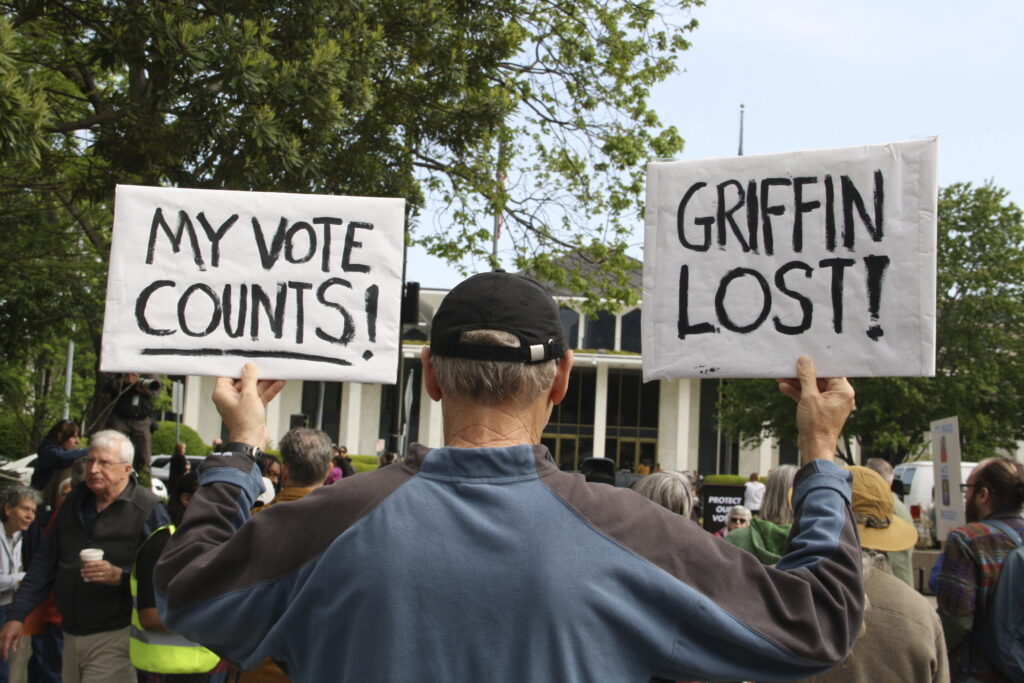
On Friday, a North Carolina court ruled to disenfranchise some 5,000 military and overseas voters unless they can cure their ballots in the state’s Supreme Court election.
Now, Democratic Justice Allison Riggs, the state Democratic party and a host of pro-voting groups are fighting to protect votes as the battle shifts to the federal courts — with legal developments coming thick and fast.
“Those who raised their hand and got first in line to serve their country should not now be first in line to have their votes tossed,” Riggs told the crowd at a rally in Raleigh Monday. She vowed to “fight as long as it takes” to ensure that every vote cast in the November election is counted.
In November, Riggs beat Republican state appeals court judge Jefferson Griffin by just 734 votes. Since then, Griffin has filed multiple lawsuits to get some 65,000 ballots tossed out.
The state Supreme Court ruled Friday that at least 60,000 ballots cast by voters with registration issues won’t be tossed out, but that around 5,000 ballots cast by military and overseas voters who didn’t provide a photo ID would be discarded unless those voters cured their ballots in 30 days.
The court also ruled that about 200 ballots cast by overseas voters who claim North Carolina as their residence but never lived there shouldn’t be counted. At least 16 of these voters identified as never-residents actually did live in the state, according to one report.
Given the narrow margin of Riggs’ original win, the court’s ruling threatens to overturn the result of the race by disenfranchising enough Democratic votes to hand victory to Griffin.
On Saturday, a federal district court ordered the state elections board to proceed with the state Supreme Court’s recent ruling. But the federal court also barred the state from certifying the election.
Then Monday, the Riggs campaign, the state Democratic Party, the state chapter of the League of Women Voters and other pro-voting groups* all appealed to the 4th U.S. Circuit Court of Appeals. They also asked the district court to halt the ballot curing process as their appeal plays out.
A majority of judges on the full 4th Circuit — which might hear the case after a three-judge appeals panel — were nominated by Democratic presidents.
And Tuesday, the board is expected to file with the district court the full number of voters whose ballots need to be cured. The board is preparing to send detailed instructions to the affected counties and voters on how they can cure their ballots as soon as possible.
Meanwhile, Griffin could be bolstered by a separate GOP scheme to gain power over elections. Last year Republicans used their super-majority — won through gerrymandering — to pass a bill that strips the state’s Democratic governor of the power to appoint members of the state’s five-person election board.
The law, which is set to go into effect May 1, gives that power to the state’s Republican auditor, instead. Gaining control of the board could give Republicans an edge in the battle over the Supreme Court race, thanks to the board’s power to administer the curing process and to certify elections.
Gov. Josh Stein is challenging the law, and a state court held a hearing in that case Monday.
*The pro-voting plaintiffs in this case, the North Carolina Alliance For Retired Americans and the VoteVets Action Fund are represented by the Elias Law Group (ELG). ELG Firm Chair Marc Elias is the Founder of Democracy Docket.
